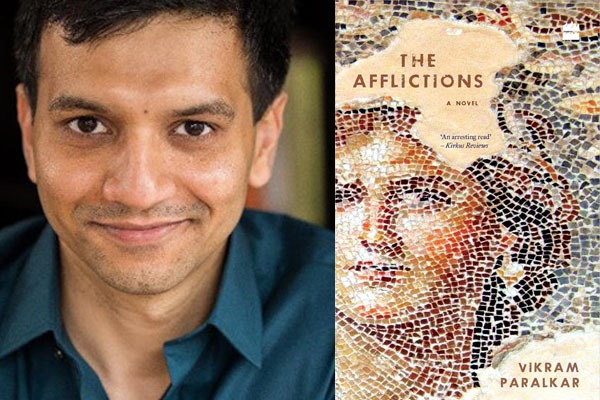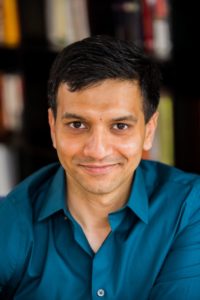I write with abandon, then edit without mercy: Paralkar

Saurabh Tankha
Born and raised in Mumbai, Vikram Paralkar is a physician-scientist at the University of Pennsylvania in Philadelphia, USA. In 2017, his book The Wounds of the Dead was published by HarperCollins India in 2017. His latest work, The Afflictions, first published in 2014 in the US has now released in India. It has also been translated into Spanish and Italian. Excerpts from an interview with Dr Paralkar…
Tell us more about The Afflictions…
The Afflictions begins with an elderly librarian (Senhor Jose) leading a young apprentice (Maximo) through a library in medieval Europe. The treasure of the library is the Medical Encyclopaedia, a compendium of all the medical knowledge of the time, and the two of them spend the day skimming through the Encyclopaedia. Most of The Afflictions comprises 50 vignettes from this fictional Encyclopaedia and they are all of imagined diseases: amnesias in which patients are forgotten by the world, blindness that migrates from person to person, epidemics of paralysis that grip entire towns.
When did you plan to write The Afflictions?
The Afflictions was first published in the US in 2014. I had been writing segments of it for several years while pursuing my residency and fellowship in Philadelphia. Because The Afflictions was an experimental work, it was (unsurprisingly) difficult to find a publisher willing to take it on from an otherwise unpublished author. Eventually, an independent publisher named Lanternfish Press, based in Philadelphia, decided to put it in print, and since then, the novel has been translated and published in Spanish and Italian and is now being released in India by HarperCollins India.
How did you go about writing this book?
The Afflictions started as a short story I intended to write based on the fable of the Tower of Babel. The story was supposed to describe a town whose inhabitants awaken one morning to discover that they now each speak a different language, and thus can no longer communicate. No sooner had I started writing the first sentences that I realised that the idea would work better as a medical vignette. From there, the idea expanded into drafting a set of vignettes about fictional diseases of language. But it quickly became clear that this was a template that could be extended far beyond that, indeed into all the different aspects of our biology that make us human. And so, one by one, I drafted an array of afflictions, each trying to pry into the fractures and contradictions at the core of our existence.
When was the first time you felt you had to express yourself through writing?
That’s a difficult question to answer since I remember enjoying writing essays in school in Mumbai and submitting little write-ups to the school magazine far before I had any conception of what it took to produce work that was worthy of the attention of another person. One distinct memory I have is of my 8th standard English teacher announcing to the class, while handing out our marksheets after an exam, that she always found my papers a pleasure to read. I suppose that’s what every author desires: that their words should please or provoke or disquiet or move another individual.
How different is it from your earlier work?
Quite different. The Afflictions is a highly experimental work, without a strict narrative but which seeks to explore human nature through the lens of disease. The Wounds of the Dead is a single narrative, set in a rural clinic over the course of one day, describing the events that follow after a surgeon is visited by the dead. Despite their differences, I think they both are united by the fact that they fall at the intersection of medicine and literature, and they both ask questions about the role of the physician in society as well as about the complexities of life, health and disease.
How difficult is it for a professional like you to take time out for penning such works?
Writing takes time and attention, and the ability to disconnect from the rest of the world in order to inhabit the mental space of the work under creation. I won’t deny this is difficult with another profession (actually two professions since I’m a scientist as well as a physician) competing for time but it is possible. But I’m certainly not the only one walking this balance — there are artists of all stripes who are juggling a full-time profession while producing art.
You feel more passionate about writing or the medical profession?
That would be a little like asking whether I’m more passionate about my right arm or my left. If pushed to make a decision about which one should be sliced off, I suppose I would have to pick, but right now my endeavours seems to working well with both of them in place.
How different or similar is Mumbai, the city where you were born and spent 24 years of your life from Pennsylvania where you have now been for so many years?
Mumbai is a city dense with people and sensorial overload, something that I both loved when I lived here as well as found increasingly challenging to handle as the density of the city grew. If I ever return to live in India, it’s quite likely that I would want to reside somewhere far outside, because I would need much more calm and quiet than Mumbai could give. But I would simultaneously miss all of the life and colour of Mumbai which meant so much to me for the first 24 years of my life. In that sense, Philadelphia, where I’ve lived for 13 years, strikes a really good balance. It’s a vibrant, diverse city with a fantastic orchestra, thriving theatre scene, indie cinema screenings, literary events, and yet it’s one where I can commute to work every day in 15 minutes. In addition, it also has the University of Pennsylvania, a world-class research institute with hundreds of top-notch researchers and an environment where I can pursue my research with cutting-edge resources at my disposal. But, there’s no doubt that the foundations of the way I look at the world, and certainly everything about my literary foundations, were laid in Mumbai.
Tell us more about yourself…
My parents are both doctors – mother is a gynaecologist and father a surgeon. They own and run a private hospital in Mumbai. I was raised just a floor above the hospital. Medicine and medical vocabulary were always in the air during my childhood, and I always had access to all the books I could read and all the science kits I wanted to experiment with. I did my schooling at St Anne’s High School in Malad, went to Ruparel for College, and did my MBBS at St GS Medical College. During MBBS, I realised that what I really wanted to do was medical and cellular biology research, and the option to pursue a career as a physician-scientist just doesn’t exist in India. So I moved to Philadelphia where I did my further training and where I currently am on faculty at the University of Pennsylvania.
Ever struggled with a writer’s block?
I don’t think there exists any writer worth her name who has never faced the blank page with a sense that an insurmountable barrier lies between her and the words that ought to be forming in that space. My own strategy for dealing with this is to just start pouring words out. One mustn’t put that much pressure on the first drafts. Write with abandon, then edit without mercy.
What is Vikram Paralkar doing when he is not writing?
I read, listen to classical music (I am on the board of the Philadelphia Chamber Music Society), watch cinema, spend time with friends and with my partner, Nate.
Plans for future…
The Wounds of the Dead is going to be published in the UK and the US later this year which I’m very excited about. It’s always a wonderful thing to connect with new readers. I’m also currently working on a third novel.


